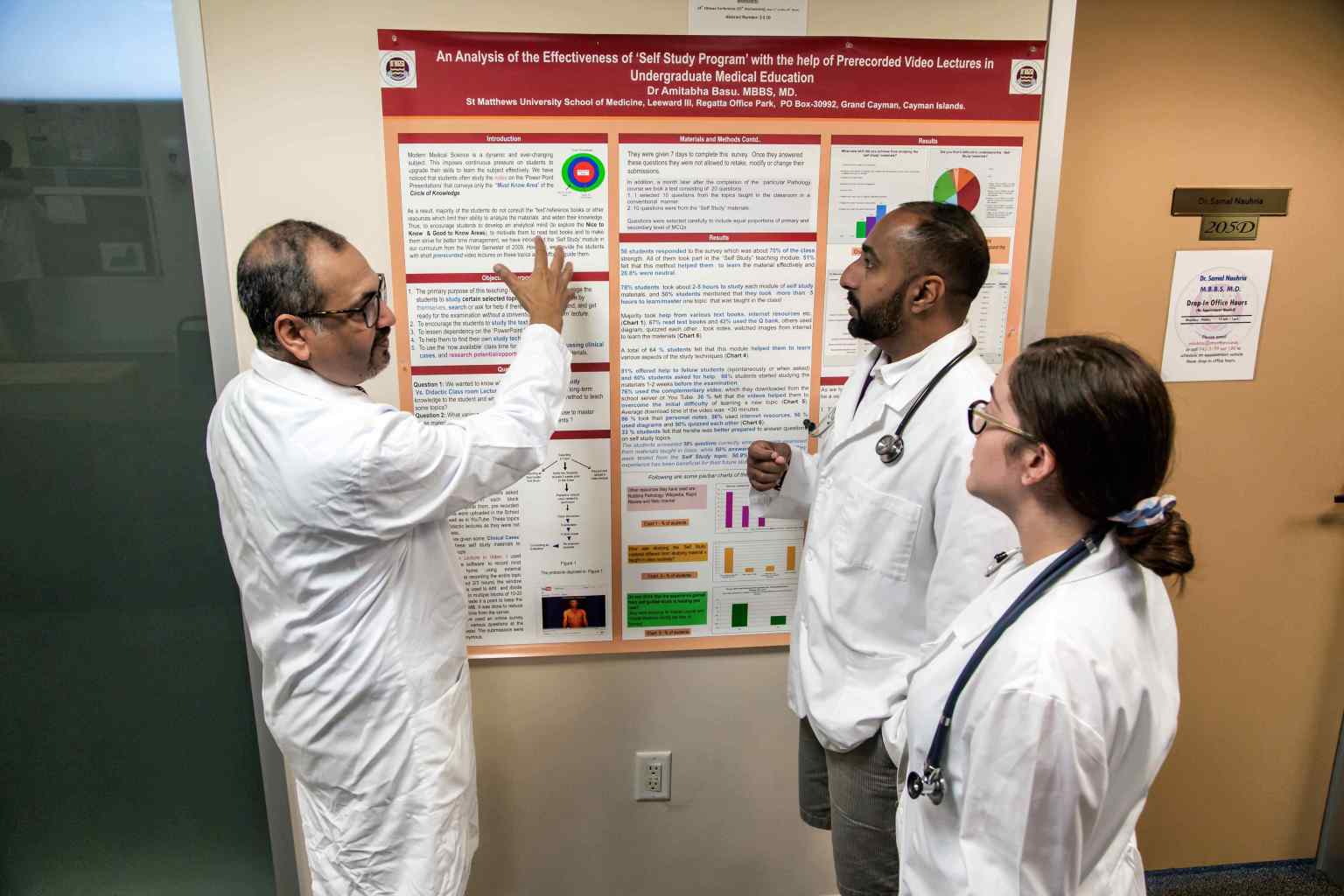
St. Matthews University Research
At St. Matthews University School of Medicine, research is a priority and integrated into our medical education program. Our curriculum is specifically crafted to equip all graduates with the necessary skills to
- Gain knowledge about the process of conducting medical research.
- Retrieve and examine pertinent data and up-to-date medical literature from various databases.
- Acquire the necessary skills to critically assess medical studies.
- Obtain valuable practical experience in research and communication of findings.
- Become a lifelong learner, continuously searching for and applying new research into their practice of medicine.
Research Rooted in the Curriculum
Students must complete and submit a mandatory and graded research project starting at the beginning of the Principles of Research and Evidence-Based Medicine course of the 1st semester and spanning two semesters. This systematic review is completed in the second semester under the guidance of the research committee chair. The research paper must be submitted as a manuscript.
During this process, students are tasked with writing a research proposal for a systematic literature review of a current medical topic. They learn to formulate research questions and hypotheses, research published literature, and critically evaluate their findings. This project enables students to practice essential segments of the research process and provides practice in self-directed education in medical topics, allowing students to gain experience disseminating research findings.
SMU Research Day (held every semester)
Students with exceptional research projects are invited to orally present their research at the Research Day. Presenting students are awarded a certificate of excellence in research. This provides an opportunity for students to showcase their work and receive recognition. Subsequently, students are encouraged to expand their research into a publishable systematic review that can be submitted to peer-reviewed research journals.
Faculty Research at St. Matthew’s University
Faculty members also present their research activities during SMU Research Day, including published and accepted abstracts or scientific articles. Here are some examples of abstracts of recent research by faculty:
- Superwomen: The Work-Life Balance of Career Mothers in Cairo. International Family Therapy Association’s 2023 World Family Therapy Congress, Malaga, Spain.
- Health Equity Assessments in Undergraduate Medical Education: A Scoping Review. Accepted to be presented at the AMEE conference in August 2023.
- Exploring Students’ Perception of Online OSCE: A Qualitative Study. Poster presented at IAMSE Conference (June 2021)
- Likely impacts of the hidden curriculum in the Basic Science curriculum for medical students- analysis of an online survey. Poster presentation: 2022 IAMSE Meeting. Denver, CO.
- Proposing a Trauma-informed Curriculum Framework for Basic Science in Medical Education. Oral Presentation (ACCEPTED). The Asian Conference on Education (ACE2023). Tokyo, Japan.
Detailed information on published, in-press, and on-progress articles by the faculty members for the past three years is available here.
Student Research Collaboration with faculty
In addition to the mandatory research component in the Basic Sciences curriculum, students can collaborate on various faculty research projects during their education’s basic sciences and clinical phases. Some examples of projects will be available here. These research opportunities enhance students’ competitiveness when applying for coveted residency programs.
Currently, students and faculty are investigating students’ perceptions of Physiology learning. This study seeks to determine the most efficient methods for acquiring and retaining physiology knowledge and what makes the physiology module more or less accessible. This study will employ a Mixed Method approach.
The Research Committee
The Research Committee, composed of faculty members, assesses all research project proposals for implementation at St. Matthews University School of Medicine. The committee thoroughly examines the projects by considering their merit, feasibility, and the validity of their experimental design.
Institutional Review Board
In addition to the Research Committee, the Institutional Review Board for Human Subjects (IRB) is responsible for ensuring the safety and well-being of human subjects. Its primary objective is to ensure that all aspects of “Informed Consent” as defined by the National Institutes of Health (NIH) of the United States are fulfilled. The IRB meticulously evaluates research protocols to guarantee that subjects are not exposed to risks and are fully informed about any conditions they may encounter during the study. The IRB consists of three esteemed faculty members from St. Matthews University School of Medicine, the Chief Academic Officer, and a community member. Approval from the Research Committee and the IRB is mandatory before conducting any research project, clinical study, or investigation involving human subjects within campus facilities or the community.